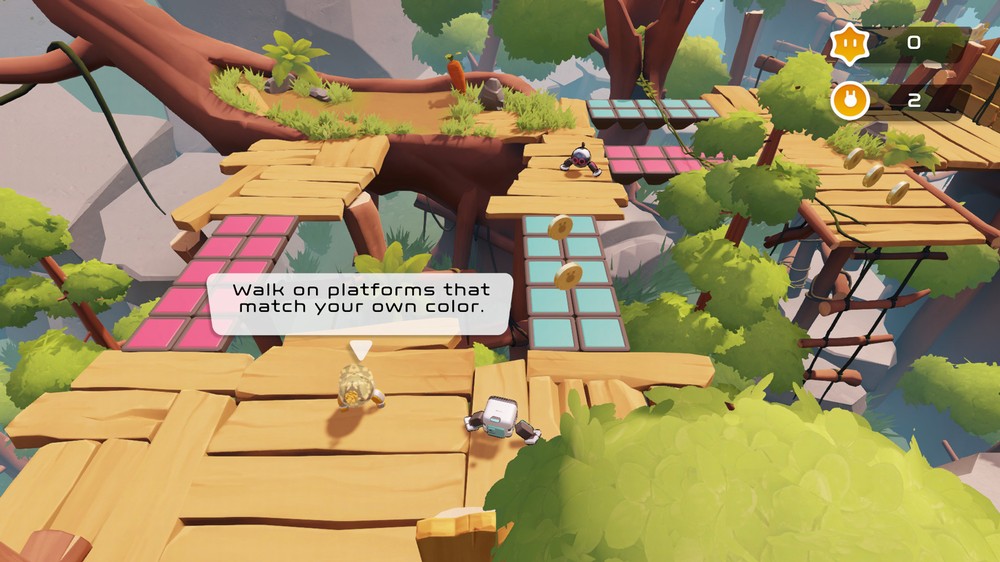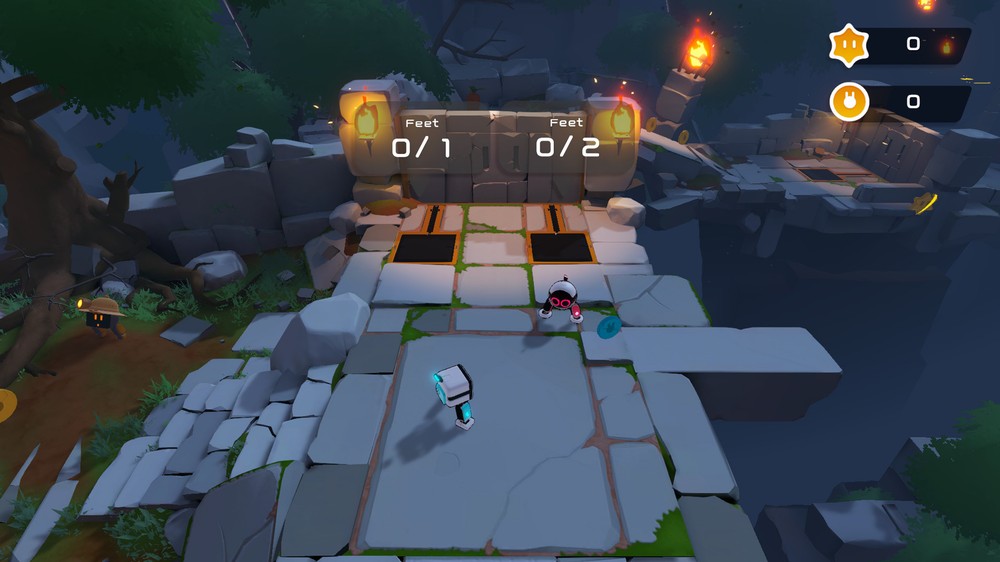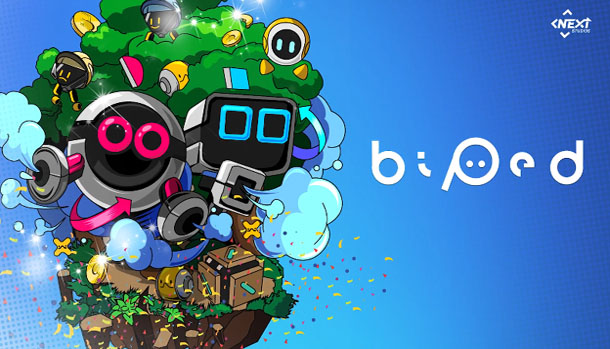If you had played Astro Bot Rescue Mission on PlayStation VR over the past couple of years, you could be forgiven for thinking that Biped comes from the same studio, or at least exists in the same universe. However, Biped, which comes from Shanghai-based developer NExT Studios, is very much its own thing, which will become apparent as soon as you pick up the controller. The name gives it away slightly, but Biped buts you in control of a two-legged robot, with the twist coming from the fact that you control each leg with one of the controllers’ analogue sticks.
This control scheme works well for the most part, and once you’ve got the hang of moving each stick in a rhythmic manner to walk effectively, you’ll discover that you have more of a sense of ownership over your character than you otherwise would have done by just pointing the sticks in whichever direction you want to go. It also allows for a variety of challenges that would otherwise seem routine, such as making your way across a spinning pole, or trying to get over a series of collapsing platforms before they tumble. There are a variety of puzzles as well, but one thing that Biped does well is that instead of challenging you to work out what you’re supposed to do, it presents an easily solved puzzle where the struggle comes from actually executing the solution.
 Biped encourages you to keep playing by switching the up the typical death mechanic that is prevalent in platformers, where dying causes you to be punished by losing your progress. This is reversed by allowing the player to continue from where they left off, and instead rewarding a low number of deaths. This makes the experience feel a lot less painful than it otherwise could do, and it allows players to laugh off their deaths instead of finding frustration in them. Alongside keeping your death count down, Biped also rewards finishing a level under a certain time limit, and collecting a number of stars, which can be earned either by venturing from the beaten path, or by completing optional tasks.
Biped encourages you to keep playing by switching the up the typical death mechanic that is prevalent in platformers, where dying causes you to be punished by losing your progress. This is reversed by allowing the player to continue from where they left off, and instead rewarding a low number of deaths. This makes the experience feel a lot less painful than it otherwise could do, and it allows players to laugh off their deaths instead of finding frustration in them. Alongside keeping your death count down, Biped also rewards finishing a level under a certain time limit, and collecting a number of stars, which can be earned either by venturing from the beaten path, or by completing optional tasks.
Most levels within Biped (8 in both the single-player and co-op modes) has a target completion time of about five minutes, but during my first playthrough I was clocking in at about 15-20 minutes each time, though knowing the levels would definitely help in getting this number down. You’ll visit a number of fairly typical platforming environments, including forests, deserts and ruins, though the tasks that you’ll be performing in each level help in making them feel distinct. As you progress through the game, you’ll be asked to take on more complicated tasks, but it never feels as if you’re being asked to do something outside of your comfort zone. Each area looks great too, with an excellent use of color, though I did find that there were some framerate drops in some of the busier levels, though never to the point where the game becomes unplayable.
 I spent most of my time with Biped playing through the single-player campaign, but the co-op side of the game is equally robust. It is a little disappointing that the co-op campaign feels a little like a retread of the single-player levels, but there is enough difference between the two in terms of challenges that you can comfortably play both and not feel like you’re doing the exact same thing. One of the biggest differences in the co-op campaign is the inclusion of Harmony Challenges, where you’ll be tested on your communication and co-operation skills. Here, you’ll need to co-ordinate your movements to overcome challenges such as crossing a bridge that only allows one player to take a step at any time, and once completed, you’ll be graded on how quickly you managed to beat the challenge, as well as how many times either of you died.
I spent most of my time with Biped playing through the single-player campaign, but the co-op side of the game is equally robust. It is a little disappointing that the co-op campaign feels a little like a retread of the single-player levels, but there is enough difference between the two in terms of challenges that you can comfortably play both and not feel like you’re doing the exact same thing. One of the biggest differences in the co-op campaign is the inclusion of Harmony Challenges, where you’ll be tested on your communication and co-operation skills. Here, you’ll need to co-ordinate your movements to overcome challenges such as crossing a bridge that only allows one player to take a step at any time, and once completed, you’ll be graded on how quickly you managed to beat the challenge, as well as how many times either of you died.
Though Biped isn’t an especially long game from start to finish, there is enough within it to encourage returning to already beaten levels, and the fact that the co-op campaign is given as much, if not more, importance than the single-player portion means that there’s good opportunity to play by yourself as well as with a friend. It’s a fairly unique experience throughout as well, perhaps feeling closest to a game like Human Fall Flat, but different enough to stand on its own two feet. Local co-op campaigns are rare enough as it is these days, but to able to play one that is not just competent but enjoyable is worthy of note, and so Biped comes highly recommended if you’re looking for someone to enjoy with a friend on the couch. The single-player content is impressive too, feeling like the develop has put genuine thought into how to keep the experience feeling fresh, and allowing each level to feel different from what you’ve played before. If you’re a fan of platformers then Biped is well worth picking up, and the fact that you can bring a friend along for the ride is a more than welcome bonus. 











